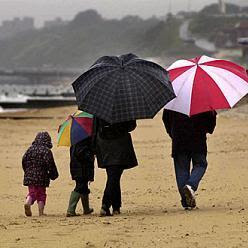
Almost nine out of ten Britons who spent a holiday-at-home “staycation” last year would choose to do the same again – according to new research.The staycation became a popular choice for holidaymakers in 2009 thanks to the recession and the tumbling value of the pound against the Euro.
This year it’s the threat of a travel disruption from the volcanic ash cloud and airline strikes, which may be influencing vacation decisions.
According to a survey by the mystery shopping and business intelligence specialists, Retail Active, most Brits were quite happy with their UK holiday, despite the washout weather and wouldn’t hesitate to stay at home this year.
It says a third of those questioned have already booked a British holiday and another third hadn’t made their minds up yet about where to spend the summer.Only 26 per cent plan to go abroad.
Eighty five per cent of the 2000 people polled said they had taken their main holiday in the UK last year and 88 per cent said that, based on their experience – they would do so again.
Ninety six per cent said they would recommend a UK holiday to friends.
The main reasons for choosing a staycation are:
* Increasing cost of holidaying abroad - 32 per cent
* Effects of the recession - 20 per cent
* Fancied a change - 18 per cent
* Cost of the Euro - 17 per cent
Fifty per cent of staycationers rated their UK holiday as “excellent” value for money, 41 per cent said the value was “good” and incredibly only 2 per cent thought they’d had “poor” value.
Self catering cottages or apartments were the top choice – 31 per cent; Caravan holidays were also popular at 21 per cent, closely followed by hotels at 19 per cent. Ten per cent chose camping in a tent - but just over one per cent went for the traditional B and B. The West Country was the favourite staycation destination – with just over 14 per cent choosing Cornwall and seven per cent, plumping for Devon.
Other top spots were, the Isle of Wight, Pembrokeshire, Bournemouth, Llandudno, Newquay, Scarborough and North Norfolk.Whitley Bay, Tynemouth and Worthing were the least popular.
Retail Active’s managing director, Julian Chamberlain said: “From the results of our survey, it looks like the “Staycation” could be here to stay for the foreseeable future.
“Many Britons holidayed in this country for the first time last year and many people were worried that British destinations and hospitality may not come up to their expectations.
“In fact, we ran a survey which showed that British accomodation had not shaken off its 1970’s Basil Fawlty image.
“Our latest results show that people have been very pleasantly surprised by what they found in the UK.
“Thirty seven per cent of those polled said they had already booked a holiday here this year and about the same number hadn’t made their minds up yet – so British resorts could be in for a bumper year, especially if the forecast of good weather is correct.”
